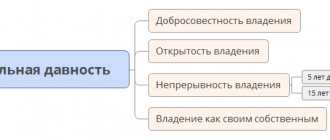A gift agreement, unlike a will, is the final and irrevocable decision of the donor, since no changes, amendments, or cancellations can be made to it. Therefore, the donor, before deciding to take such a step, needs to think carefully about everything and foresee the possible risks arising from such a gift. Since the registration of a deed of gift for real and movable property to some extent or fully infringes on the rights of other heirs, the question arises - is it possible to recognize the gift agreement as invalid?
And the donors themselves sometimes come to their senses and regret what they have done, so this question never loses its relevance. The legislation of the Russian Federation provides for exceptional cases when a gift agreement can be terminated or declared invalid. It is only possible to achieve cancellation of the deed of gift only through the court and if there are compelling reasons.
How to invalidate a gift agreement
Both the donor himself and all persons whose legal interests were infringed by this agreement can challenge the gift agreement in court, therefore any of them can file a claim in court. The procedure for declaring a deed of gift invalid takes place in accordance with the following principles:
- Cancellation of a completed transaction and recognition of it as invalid can only be carried out in court;
- The legislation of the Russian Federation establishes a limitation period for a gift agreement, after which no one has the right to challenge it, therefore, in order to increase your chances of a positive court decision, you need to hurry;
- in some cases, namely if the applicants have valid reasons, supported by facts or documents, the court may extend the statute of limitations in the case;
- To cancel the “gift” the plaintiffs must have strong arguments and grounds.
Registration of DD under the influence of violence
Violence means psychological or physical influence on the donor by the recipient or a third party to force him to formalize a DD: threats, blackmail, beating, etc.
Such actions lead to the conclusion of a transaction against the will of the donor, and it does not reflect his true will.
The man persuaded his father to issue a deed of gift for him, according to which all the property would go to him. The father did not agree, and then the son began to beat him.
Having given up, the owner signed a deed of gift. Subsequently, he called the police and filmed the beatings, then challenged the deal in court, citing Art. 179 of the Civil Code of the Russian Federation, according to which the DD must be declared invalid.
Grounds for invalidating a deed of gift
Making such a valuable gift as real estate or a vehicle should be a deliberate and not an impulsive decision, since returning the object of the gift is almost impossible, but still possible. To go to court to challenge a deed of gift, you need compelling reasons. Depending on who the plaintiff is - the donor or the person whose interests were infringed, the reasons may vary.
Important! When recognizing a deed of gift as invalid, the court is guided exclusively by the legislative acts of the Russian Federation.
If the donor disputes
The grounds for declaring a gift agreement at the initiative of the donor invalid according to Russian legislation are:
- significant deterioration in the financial situation and/or health of the donor resulting from the transaction;
- the successor has treated his donor poorly, which can be confirmed by written testimony of witnesses;
- the donee attempted or actually used physical force against the former owner of the property, as evidenced by a certificate from the traumatology department with recorded beatings (abrasions, hematomas, fractures, etc. recorded by a medical professional);
- the donation agreement contained a clause according to which, in the event of the premature death of the successor, the donated property returns to its former owner, and if this was not provided for in the agreement, then the right to the gift is acquired by the legal heirs of the deceased;
- the former owner can prove with documentation (using photos, videos, testimony) that the donated property was mistreated, as a result of which its condition has noticeably deteriorated and can lead (or has already led) to destruction.
If disputed by persons whose interests were affected
The legal heirs of the donor, whose rights to inheritance were infringed in connection with the execution of the gift agreement, have the right to apply to the court to declare the document invalid if:
- at the time of drawing up the deed of gift, false documents were used;
- there were gross errors in the deed of gift (in passport data, tax identification number, information about the object, etc.);
- there is no state registration of the transfer of ownership from one person to another (often this point is ignored and postponed indefinitely);
- there is documentary evidence that at the time of registration of the deed of gift the donor was in an incapacitated state (was being treated in a psychoneurological or drug treatment clinic, was registered with a psychiatrist or narcologist);
- the gift agreement was drawn up in a legally illiterate manner (has clauses that contradict current legislation, etc.);
- the legal successor at the time of receiving the property as a gift was incompetent, that is, he could not soberly evaluate his actions and be responsible for them.
Statement of claim to invalidate the gift agreement
In order to recognize the invalidity of a gift agreement through legal proceedings, first of all, it is necessary to correctly draw up and execute a statement of claim. With a competent approach, from a legal point of view, to filing a claim in court, the chances of a positive court decision will increase significantly.
The statement of claim must contain the following information:
- Full name of the plaintiff and defendant.
- Passport details (if possible of both parties).
- Information about the donation agreement (number in the register, date of registration, etc.).
- Data of title documents for housing alienated as a result of donation (certificate of inheritance, purchase and sale agreement, deed of gift, etc.).
- Degree of relationship with the donee (defendant).
- Details of the donation transaction.
- Grounds for cancellation of the contract.
- A list of attached documents and other information that may, one way or another, affect the outcome of the case.
The following must be attached to the claim:
- a check confirming payment of the state duty;
- copies of documents confirming the existence of valid grounds for termination of the gift agreement;
- copies of passport;
- copies of title documents;
- a copy of an extract from Rosreestr;
- copies of the deed of gift (if available to the plaintiff) and other documents.
Limitation period for an apartment donation agreement
Despite the fact that it is very difficult to challenge a gift agreement and cancel it, it is quite possible to do this if you do not delay going to court, since, as in any other case, there are also statutes of limitations established by law. You can file a claim with the court to declare the transaction void within 12 months in accordance with paragraph 2 of Article 181 and Article 197 of the Civil Code of the Russian Federation. If we are talking about the need to recognize a contract that is voidable, invalid, then the limitation period in this case is 3 years, as discussed in paragraph 1 of Article 181 and Article 196 of the Civil Code of the Russian Federation.
There are cases when the plaintiff is not the donor himself, but third parties whose interests were infringed as a result of the donation of property (relatives, guardianship authorities and other government services). In this case, according to paragraph 1 of Article 181 of the Civil Code of the Russian Federation, the period within which one can go to court to declare the deed of gift invalid is 10 years, since these plaintiffs were not parties to the transaction and did not have the opportunity to be informed about it in a timely manner. Moreover, third parties can file a lawsuit to declare the agreement null and void only after the death of the donor.
Sample statement of claim for invalidation of a gift agreement
A correctly drafted statement of claim significantly increases the chances of success, so it is better to engage an experienced lawyer who specializes in such cases to draft and file it. But you can also draw up a legally competent statement on your own if you study the legislative framework in as much detail as possible and use a sample statement of claim, which can be supplemented, amended, etc. The main thing when drawing up a claim is to be extremely careful and not to miss a single important detail, even if at first glance it seems insignificant.
Review of special cases
There are many types of gift agreements, each of which has its own nuances and features. The main factors on which the specifics of the execution of such agreements depend are the main object of the gift, as well as who acts as the donor and the donee.
The donation of real estate must be formalized with a notary and certified by the MFC. Are taxes paid when donating real estate to close relatives? You can find out here.
Donation of funds
The plaintiff goes to court, filing a claim against the defendant, demanding the cancellation of the gift agreement. Pointing out that the money was originally intended for his daughter (who is the defendant in this case), the plaintiff says that after the transfer she began to show aggression towards the donor in every possible way.
In particular, the defendant attacked him, causing him bodily harm, and there is a witness who can confirm this situation, indicating specific circumstances. Special attention is paid to the fact that a criminal case has already been initiated on this fact, as a result of which a court hearing was held, where the court found the defendant guilty.
Based on the results of the court hearing, the court fully satisfied the father’s demands, since in accordance with paragraph 1 of Article 578 of the current Civil Code, the donor has every right to cancel the gift agreement if, after its execution, the donee encroaches on his close relatives or directly on his health and life.
Promise
The donee applies to the district court, filing a claim against the heir of the deceased owner, demanding recognition of ownership rights to the apartment, which is currently at the disposal of the defendant, with a requirement to transfer it in favor of the plaintiff. The claims are motivated by the fact that a deceased friend, who was the owner of this property during his lifetime, gave the plaintiff real estate.
To prove his claims, the plaintiff invited several witnesses to the court, who confirmed that the former owner of the property had indeed repeatedly stated that he was giving it to his friend (the plaintiff), and he would be able to live in it after his death.
During the trial, it was established that even after these statements, the owner continued to be in the apartment, was engaged in minor repairs and, in other words, fully exercised his powers as an owner.
In this regard, the court of first instance established in the relationship between the plaintiff and the former owner of the property a promise of donation in the event of the death of the donor, but, referring to Part 3 of Article 572 of the Civil Code, in the final court decision it was established that such a promise cannot be perceived as a full-fledged gift agreement , and the relationship between the parties cannot be assessed from the standpoint of inheritance law.
In accordance with Part 1 of Article 1124 of the Civil Code, a will can only be drawn up in writing, and must be certified by a notary. In case of non-compliance with such rules, the document is considered invalid, and therefore the plaintiff’s stated demands were denied.
Article 1124. General rules regarding the form and procedure for making a will
A feigned agreement
A sham agreement refers to the category of agreements whose main purpose is to cover up another type of transaction. For example, in the 90s of the last century, it was quite common to draw up an annuity agreement instead of a standard gift agreement in order to avoid paying the corresponding tax.
Already by the beginning of the 2000s, some rent payers (and especially those who were in marital relationships) realized that this option was quite unprofitable for them, since, in accordance with current legislation, these agreements fall into the category of compensation, and therefore the acquired During a divorce, property will be divided between the spouses.
Current judicial practice is mainly based on the claims of various government and other bodies, since in the vast majority of cases it is drawn up with the aim of ensuring benefits for the owner of the property. For example, if the judicial or tax authorities are going to seize property, as well as if you need to reduce your own taxation.
In the vast majority of cases, the current legislation in such situations does not return everything received under it to the previous owners, but is aimed at applying the rules of the transaction that was actually meant in the process of concluding the gift agreement.
Imaginary deal
In practice, a situation occurred when legal proceedings were conducted against the debtor in order to compensate for the damage caused during the fire, and therefore the debtor donated a certain part of his own property to his daughter in order to save it from collection. Despite the fact that during the consideration of this issue in the court of first instance the transaction was declared invalid, higher courts overturned this decision and dismissed the claim.
In this case, the courts were based on the fact that, due to the complete freedom of contract, the debtor had every right to draw up a deed of gift for this property in favor of his daughter, despite the fact that at that time legal proceedings were ongoing against him related to compensation for a fairly large amount of damages.
The courts ruled that the debtor had no obligations to the creditor, since essentially in this case the dispute related to compensation for damage caused by the fire was not resolved.
The fact that after the alienation of this property the debtor did not stop using it, the judicial authorities considered it insufficient to qualify the transaction as sham. The courts concluded that there were no obligations to the creditor on the part of the debtor at the time of transfer of property on the basis that during the alienation process there had not yet been a final court decision that had entered into legal force.
In practice, despite the pending court decision, the debtor’s guilt had already been established in connection with the decision to refuse to initiate a criminal case, which at that time entered into legal force and was presented in the case materials. At the same time, initially the debtor said that he did not use the specified property, but changed his position during the consideration of the case in other legal proceedings, but this was also not taken into account by the courts of appeal, supervisory and cassation instances.
Thus, the claim was dismissed on the ground that the property being transferred was not subject to any restrictions or restrictions that would prevent its former owner from lawfully providing the property to his daughter as a gift.









